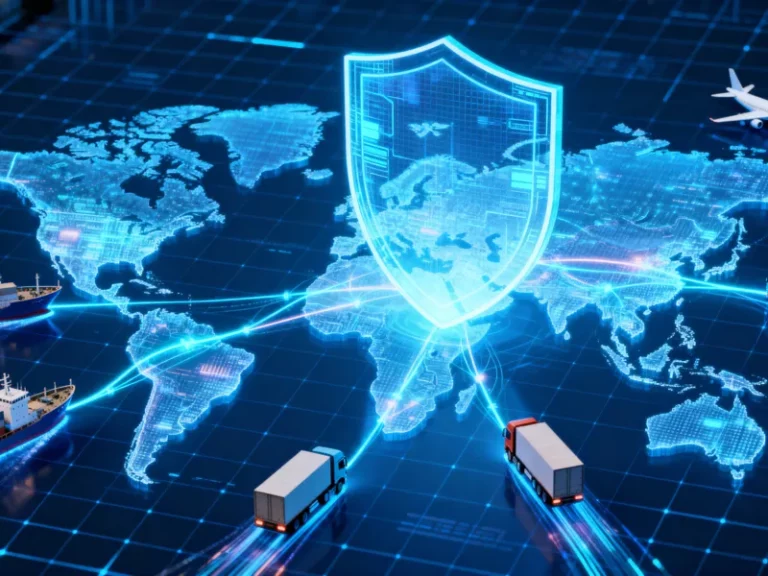The logistics industry has undergone a massive transformation in the past decade; automation, IoT devices, real-time tracking, digital warehousing, and interconnected supply networks have become the new standard. But with this acceleration comes an equally fast-moving set of cyber risks. Cybersecurity in logistics is no longer a technical add-on; it is now an essential infrastructure. Businesses depend on digital continuity just as much as physical transportation.
The New Reality: Logistics Runs on Data
Every shipment scanned, every route optimized, every warehouse process automated, behind all of it sits data. And that data passes through multiple systems, partners, and regions worldwide. This complexity creates an environment where cyber risks can easily cross boundaries.
When a single system is compromised, operations across trucking fleets, ports, customs clearance, inventory management, and last-mile delivery can come to a halt. That’s why cybersecurity has become a foundational part of the ecosystem.
Where the Threats Are Emerging
Cyberattacks targeting logistics businesses are more strategic than ever. Attackers know that downtime is costly, and many rely on ransom or disruption to pressure companies into paying. These vulnerabilities are growing as more tools and platforms become digitally connected. To understand the risks, we first need to look at the most common threat areas.
- Attacks on Transportation Management Systems (TMS) and WMS
Digital platforms controlling inventory, routing, and orders are prime targets. If these systems fail, goods stop moving, creating immediate financial and operational impact.
- Compromise of IoT Devices Across the Supply Chain
Logistics is full of IoT tools: barcode scanners, vehicle telematics, RFID tags, smart containers. Each device is a tiny entry point that, when unsecured, can expose a network.
- Ransomware on Critical Infrastructure and Ports
Ports and major logistics hubs have been hit with ransomware multiple times globally, causing delays and millions in losses. These attacks often spread through shared networks or outdated systems.
- Data Theft Within Multinational Partners
Because logistics relies on many external parties, such as carriers, warehouses, and customs brokers, the supply chain becomes an open ecosystem. A breach in one partner can create vulnerabilities for everyone.
The Role of Cybersecurity in Building Operational Resilience
To respond to these evolving risks, cybersecurity must be integrated into daily logistics operations, not treated as an isolated IT project. The goal is to protect continuity, accuracy, and trust at every stage of the supply chain. So, what does this look like in action?
- Enhancing End-to-End Visibility
Cybersecurity provides monitoring tools that show real-time anomalies across devices, systems, and networks. This helps logistics teams detect unusual access or suspicious data movement before it becomes a crisis.
- Securing Connected Fleets and Smart Warehouses
Modern logistics uses automation heavily, from autonomous forklifts to route-optimized fleets. Cybersecurity ensures these smart systems operate safely by:
- Authenticating each connected device.
- Encrypting communication between fleet and control centers.
- Preventing unauthorized remote access to vehicles or equipment.
- Protecting Digital Transactions and Customer Data
From e-commerce shipments to B2B freight, logistics involve constant data exchange. Cybersecurity ensures the confidentiality of pricing, customer information, invoices, and shipment records through:
- Strong access controls
- Encrypted data transfers
- Regular system audits
- Strengthening Vendor and Partner Security
Because logistics ecosystems are interconnected, cybersecurity sets standards for every external vendor to access critical systems. This minimizes the risk of a breach spreading across multiple partners.
Looking Ahead: Cybersecurity as a Competitive Advantage
As logistics companies push deeper into digital operations, cybersecurity evolves from a protective layer into a genuine competitive advantage. More than ever, clients look for partners who can guarantee secure, uninterrupted workflows, because a single breach or delay can ripple through an entire supply chain. When an organization invests in strong cybersecurity, it strengthens its operational continuity, boosts customer trust, supports regulatory requirements, and ensures long-term stability across every link of the network.
At Terrabyte, we help logistics businesses build this resilience with security solutions designed to keep operations protected, efficient, and ready for the future. In an industry where downtime is costly and speed is everything, cybersecurity becomes the unseen engine that keeps goods moving safely and reliably.




